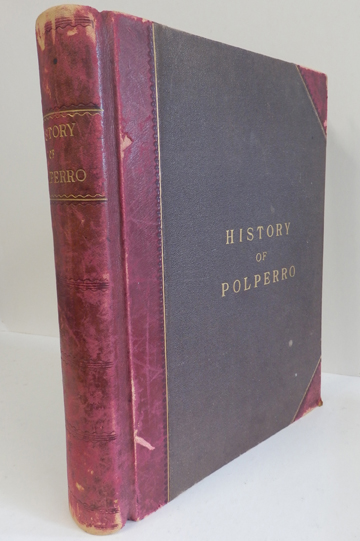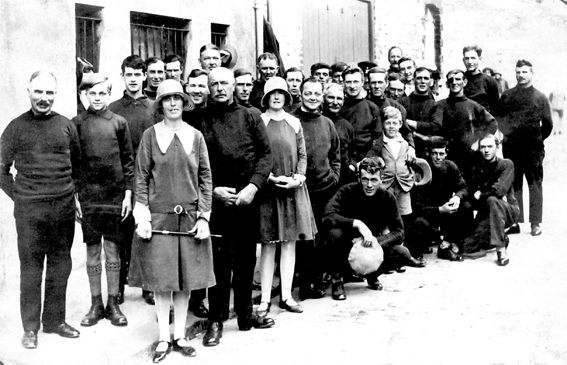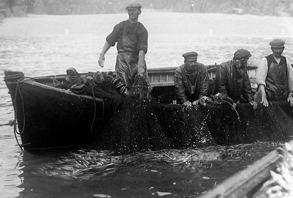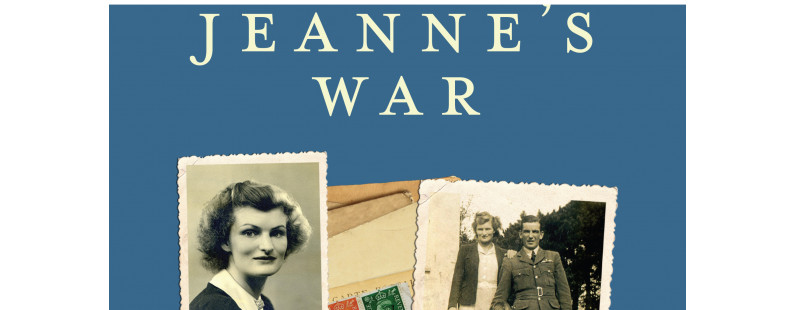Polperro Postscripts
A blog for anyone with an interest in Polperro, publishing and people... with occasional musings on history and humanity.
Subscribe
Recent Posts

Jonathan Couch (1789-1870), the surgeon apothecary of Polperro who became one of the pioneering natural historians of his day, is largely remembered for his many publications during his lifetime including his four-volume Fishes of the British Islands.
A hitherto unknown manuscript edition of his History of Polperro has been discovered more than 150 years after it was written in 1847, three years before the author’s death in 1870. A later edition of the History of Polperro, edited by his son Thomas Quiller Couch, was subsequently published in 1871.
The large bound volume consists of 160 pages written in Jonathan Couch’s copperplate handwriting, amounting to nearly 34,000 words and appears to be an early draft version of the History of Polperro that was eventually published. The two versions differ markedly however. Couch’s original draft includes chapters on the storms of 1817 and 1824, the harbours and piers, fishery, trade and religious history, much of which does not appear in the final published edition.
The manuscript is accompanied by an Index compiled by one of the volume’s early owners, Henry Lee Rowett (1844-1922), in 1898.

Polperro Fishermen's Choir Centenary
Polperro Fishermen's Choir celebrates 100 years
Posted on February 8, 2023

The Polperro Fishermen’s Choir celebrates its centenary this year. Founded in 1923 (pictured above), it has continued to perform for audiences ever since, raising funds for charity. For many years the prosperity of Polperro depended on the pilchard industry. The fishermen were a hardy breed of men and the Chapel had a great influence on their lives. They were devout men who would sing as they worked their boats; and not surprisingly many of these songs were hymns that were sung in Chapel on a Sunday. When the pilchard fishing began to decline; the singing did not.
It was Eva Cloke, the organist at the Chapel and Thomas Mark, a lay preacher known locally as the ‘Fishermen’s Bishop’ who realised the need to establish the Polperro Fishermen’s Choir in 1923. The choir would sing hymns and religious style songs in Chapel on Sundays and at Harvest of the Sea services as well as other religious fishing festivals around the county in the 1920s and 1930s. The choir’s reputation grew and they were soon singing regularly in the village and in different parts of Cornwall. At the time some 90 per cent of the choir were fishermen from Polperro.
But, with the decline of the fishing industry, the choir suffered losses until other tradesmen from around the village joined in. It was disbanded for the duration of World War II but was reformed in 1951. The Choir’s ‘uniform’ in the early days was a rough knitted roll-neck gansey, knitted by the wives and daughters for their men folk. Each man could be identified by the pattern of his gansey, a tradition which had continued down the years. In 1982 the choir ‘modernised’ and adopted a black blazer with badge and a roll neck shirt or sweater.
After Eva Cloke’s death in 1969, the choir continued to perform concerts not just in Polperro but throughout southern England, including television appearances for both BBC and ITV as well as recordings for BBC Radio, Radio Cornwall and Plymouth Sound. Other performances included visits to Quiberon in France and the Royal Albert Hall in London.
In 1973 the choir celebrated its Golden Jubilee year by making their first long-playing record entitled ‘Sounds like Polperro’ which became a best seller and remains a favourite today. This was quickly followed by ‘Polperro Sings Again’; ‘When evenings Twilight’; ‘Tis Christmas time’; ‘Born In Song’ and ‘Polperro Sails’. In 1992 almost all the choirs in Cornwall sang together at Truro Cathedral to a full capacity audience.
The tradition of the Choir runs deep within the original Fishermen’s Choir families. Phil Carrigan became the musical director in 1999, having served with distinction in Her Majesty’s Band of the Royal Marines. He has played before the late Queen and the Queen Mother as well as concerts around the world including Washington D.C. and the West Indies. Probably his greatest claim to fame is when he lost his bass drum over the side while on parade on the flight deck of HMS Ark Royal in 1971 much to the amusement of the captive audience. It is said the entire ship’s company spontaneously broke into a chorus of ‘Sailing’ thus pre-empting their now famous recording!

Record Pilchard Catch by Polperro Boat
Record pilchard catch by Polperro boat
Posted on September 26, 2022
The record catch of pilchards by a Polperro boat off Cornwall occurred in 1866 according to a first hand account that recently came to light. The story of the catch was told by one of the crew, Joseph William Gedye (1873-1954):

‘On an autumn day in the year 1866 the Polperro gaffer J.R.N. (representing the names Joseph, Rachel and Nicholas Gedye) was lying weatherbound at Plymouth with several other Polperro and Looe Luggers. The owner of the J.R.N. was Mr. Joseph Gedye, the Captain was Mr James (‘Mollie’) Curtis and the crew Joe Gedye (son of Joseph), Jack Gedye, W. Bunt and T. Searle. The weather having improved on the following morning the J.R.N. sailed with three other boars for the fishing ground south of Eddystone. Shortly after arriving there a stiff S.E. wind rose and the three other boars returned to Polperro. J.R.N. under two reefs continued. Jimmy Curtis called out “Shake out the reef. Jacko [J. George] take over helm. I’m going to put on my oilskins”. Jack remarked “That’s settled it. We shan’t go in tonight.” (He was courting at the time). Curtis saw gannets diving. They shot the nets and hauled 2,000 pilchards. Turned south and Joe and Jack started ‘brining’ (stamping on fo’c’sle). Found themselves in the midst of a vast shoal – fish were swarming everywhere.
‘Jimmy called out “Let me know when we are through. Don’t put the lights up”. They shot nets and returned over the same course. Had a cup of tea and then started to haul nets but could not get them in. They were so full of fish that they were aground. At dawn the next day some Looe Boats arrived and took over some of the nets. The J.R.N. took on board ten lasts (100,000) and got in to Polperro at 4.30pm. This remains today a record catch of pilchards for a Polperro boat. The fish sold for 5s. a 1,000. Next night J.R.N. was out again and caught 20,000.’
The owner of the J.R.N., Joe Gedye’s father was also named Joseph William Gedye (1837-1907). Joseph Gedye senior had become the innkeeper of the Three Pilchards by 1870, just a few yards along from the former Fishermans Arms in Lansallos Street. After his death in 1907 he was buried alongside his wife Rachel (née Batten, 1839-1887) in Talland churchyard.
His son Joe, who told the story of the record catch, married Fanny Tangley Holt (1872-1959). The Cornish Times reported in June, 1947, that 75-year-old Mrs Fanny Gedye was living ‘in one of those tiny cottages which cling so precariously to the steep slopes of Polperro… For the past 12 years Mrs Gedye has suffered from rheumatism of the spine. She was blitzed out of Plymouth during the war’.

